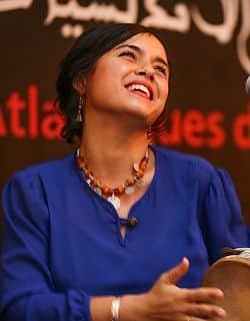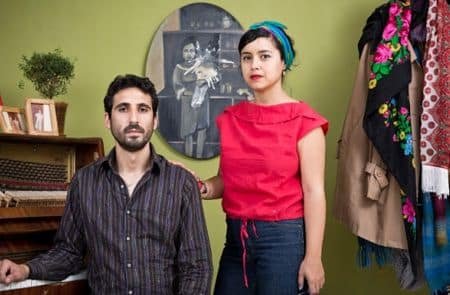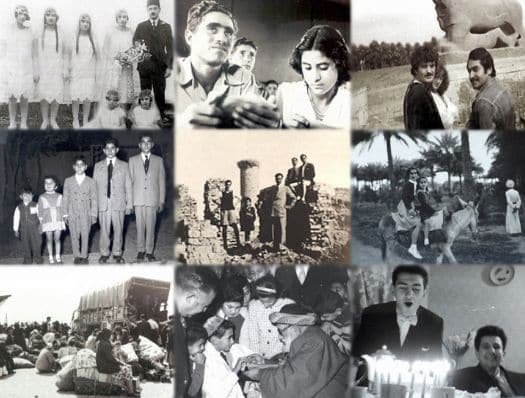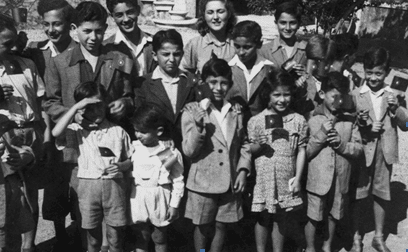
Sephardi Ideas Monthly is a continuing series of essays from the rich, multi-dimensional world of Sephardi thought that is delivered to your inbox on the second Monday of every month.
For the past few months, Sephardi Ideas Monthly has explored Moroccan-Jewish music from a number of different angles: Sam Thomas wrote about the Amazigh elements, Mohamed Belmaaza investigated piyyut ─Sephardic liturgical poetry and (soul) music─from a Moroccan, non-Jewish perspective, and Ben Shalev and Chris Silver examined the life and career of Jo Amar, the great Moroccan-born vocalist and payytan. For the month of August, Sephardi Ideas Monthly extends its exploration of Moroccan-Jewish culture in general, and Moroccan-Jewish music in particular, through an exclusive interview with Neta Elkayam and Amit Hai Cohen, one of the most interesting musical couples to appear on the Israeli scene in recent years.

Neta Elkayam & Amit Hai Cohen
Born and raised in the working-class southern town of Netivot, Elkayam and Cohen, creative and life partners, have spent the past few years fashioning a thick, Moroccan-Jewish musical identity by traveling to Morocco, learning Arabic, writing original compositions in Judeo-Moroccan Arabic, and performing music inspired by the mid-20th century style typical of Jewish musicians across North Africa. For their musical projects, Elkayam sings while Cohen plays piano and various string instruments.
But make no mistake, the couple’s musical identity isn’t simply a function of aesthetics. Elkayam and Cohen are deeply engaged in an act of cultural reclamation─researching, re-imagining, and, to the degree possible, reconstructing in a contemporary context the hybrid Jewish-Moroccan identity that was marginalized when the community moved en masse to Israel.
Along the way they have created some of Israel’s most interesting and enjoyable music, with Haaretz music critic Ben Shalev including their song, “Howa Jani,” in his top ten list for 2014-15.
Elkayam and Cohen have performed in Israel and around the globe, including in the United States, Poland, and, of course, Morocco. They are now, along with some Moroccan friends, putting the finishing touches on their first album, which was recorded at their home studio in Jerusalem.
Sephardi Ideas Monthly caught up with the busy couple for a series of discussions via email and in person.
SIM: Neta and Amit, you have both traveled to Morocco as part of your interest in reclaiming a strong Moroccan-Jewish identity. Or more simply, because you feel at home there. What strikes you in particular about the country?
Amit: In Morocco you don’t learn pluralism, you live with it. There is respect based upon religion, based upon the idea of one God.
SIM: Is this pluralism reflected in the music?
Neta: Absolutely, Moroccan music is full of influences, from Berber, African, Arab, Spanish, and Andalusian elements to the French chanson. The different groups who passed through the country have always left their mark, and it seems that despite colonialism, elements of the occupying French power were preserved, and even warmly adopted. In my opinion, the pluralistic Moroccan approach embodies the capacity to absorb the good from other cultures, similar to the Talmudic teaching that, “If someone tells you there is wisdom among the nations, believe it.” It’s reminiscent of Maimonides’ adage to “hear the truth from whomever says it.” Remember, Maimonides lived in Morocco.
Amit: Morocco is a collection of different cultures, very similar to Israel in this respect. So it’s difficult to pin down the concept of Moroccan music as something fixed, there isn’t even one kind of Moroccan music that you can designate as the basis for others. Every ethnicity brings with it an entire world and sometimes you have cross-fertilization between different kinds of music. The Jews, for example, were always an inseparable part of what’s called, “Moroccan music.” They gave and they received and they created something original that inspired others.

Neta Elkayam and Amit Hai Cohen in their living room, Jerusalem, Israel (Photo courtesy of Jerusalem Season of Culture)
SIM: What can Israeli society learn from Moroccan society?
Neta: The role of women in musical life.
Amit: In Morocco you see women participate in the religious world, through music.
Neta: Look, a woman has something to say wherever she might happen to be. On the one hand it’s true that Jewish women didn’t sing in synagogue. However, this “marginalization” paradoxically created a large, open space outside the walls of the synagogue. So women’s music dealt with prosaic, everyday life and a woman’s personal experiences, love and pain, were transformed through music. Women also played an important role at weddings, births, henna ceremonies, circumcisions, and bar mitzvah celebrations. Sephardi Judaism as it exists in Israel today has become extreme in a way that wasn’t acceptable in Morocco.
Amit: Even today it’s difficult to find women’s orchestras in Israel, definitely not in the context of religious music as it’s often found in Morocco, where you have women’s orchestras in which they sing and play instruments and it’s considered to be natural and honorable. Today in Israel, women’s music has much more exposure, but still not in the religious context. In this respect the Moroccan community in Israel has become much more extreme and tends to be stricter like the Ashkenazim.
SIM: Do you listen to piyyut?
Neta: Of course! Through piyyut l learn about Jewish musical styles, and Judaism.Piyyut is a broad, sophisticated world. The Judaism I met at school is different from Moroccan Judaism. There is this excessive concentration on Law, on marginal details. Piyyutim were at our Shabbat table, in the synagogue.
SIM: Amit?
Amit: I deeply admire R’ Haim Louk. Thank God we have R’ Haim Louk, he is an amazing source.
SIM: A question for both of you: if you could recommend one Moroccan musician or vocalist for someone interested in learning about Moroccan music, who would you recommend?
Neta: Without a doubt I would recommend Zohara al-Fasiyya, the voice that I love the most. When it comes to men, Salim Hallai, who succeeded through his music and virtuosity to break down all kinds of borders.
Amit: Salim Hallali, he’s colorful, rich. He sings every possible style, even in Yiddish, he knew to use different styles but remain Moroccan. He’s a big inspiration for us. His performances became classics, even though they were the most innovative for that period.
SIM: Please share a few words about the disk that you are now working on.
Neta: The disk first of all is music. Music is a language that transcends nations and boundaries. The disk also includes a mix of our Moroccan identity, a little Jewish, a little Berber, Muslim, Spanish, Mediterranean, and Israeli in a universal way. The songs are in Judeo-Arabic, but the message is for here and now. You have the woman’s voice and the voices of the second and third generation immigrant musicians from Morocco to Israel, and so more than ever, the music also relates to the future: in order to go forward, we’re seeking out everything that was lost and erased.
Amit: The songs on the album will all be original compositions, except for one. We want to make a Jewish Moroccan album that’s relevant for our life today, and that creates a number of challenges. Mainly, the language, the tension between what the Jews spoke in Morocco 60 years ago and the Arabic spoken today in Morocco is something that always comes up. Because of this we work very closely in the studio with people from the generation that moved to Israel, including Rueven Abargel [SIM: activist and original member of Israel’s Black Panthers] who, aside from being a spiritual father is also an Arabic speaker who understands the language’s nuances. Muslim Moroccan friends are also in daily contact with us. I listen to a lot of albums made by Jewish Moroccans from the 1950’s in order to understand what moves me in the way music is heard. There’s something rough and raw together with an emphasis on “performance” that we’re bringing to the album.

Screening: The Last Jews Of Baghdad: End of an Exile, Beginning of a Journey
Southhampton Jewish Film Festival
7:30PM on August 9th
Southampton Arts Center
25 Jobs Lane
Southampton, NY 11968
The Last Jews Of Baghdad provides a historical and personal view of the persecution, torture, escape, and flight of over 160,000 Jews from Iraq between the years 1940 and 2003. Carole Basri, born to Iraqi Jewish parents and a Vice President of the American Sephardi Federation, presents an amazing account of Jewish life in Iraq based on first hand accounts. Ms. Basri will be on hand to discuss her film and the history of Iraqi Jews. This will be a very special evening and a rare opportunity to meet the filmmaker. The Last Jews Of Baghdad premièred at ASF’s NY Sephardic Jewish Film Festival.
Please click here to purchase tickets
(General Admission $15; Students under 21 $7.50)
Reservations Suggested

The Converso Project
IAJGS International Jewish Genealogical Conference
7:30PM on August 9th
Sheraton Seattle Hotel
1400 6th Avenue
Seattle, WA 98101
Join the Society for Crypto-Judaic Studies and Genie Milgrom,genealogist and author of My 15 Grandmothers, to formally unveil ‘The Converso Project’ at the annual conference of the International Association of Jewish Genealogical Societies in Seattle, WA. The project will give the public access to the various sources of genealogical information of conversos, those forcibly converted to Catholicism during the Inquisition.
Please click here for more information

Portugal, The Last Hope: Sousa Mendes’ Visas for Freedom
April 7th through September 9th
Center for Jewish History
15 West 16th Street, New York City
The American Sephardi Federation, Portuguese Consulate of New York, the Sousa Mendes Foundation, and the Municipality of Almeida, Portugal proudly present a new exhibition in the Leon Levy Gallery honoring Aristides de Sousa Mendes, the courageous and creative Portuguese diplomat who saved Salvador Dali, the authors of Curious George, and thousands of other Holocaust refugees.
Please click here for viewing hours
ASF Monthly: info@sephardi.house
Copyright © 2016 American Sephardi Federation, All rights reserved.
The American Sephardi Federation is a proud partner of the Center for Jewish History (15 West 16th St., New York, NY., 10011).
American Sephardi Federation | http://www.AmericanSephardi.
update subscription preferences
 eSefarad Noticias del Mundo Sefaradi
eSefarad Noticias del Mundo Sefaradi

